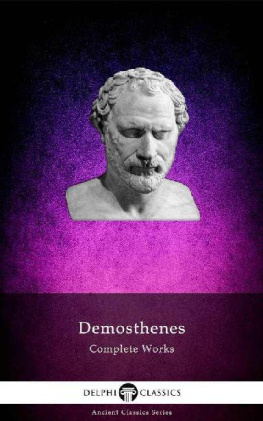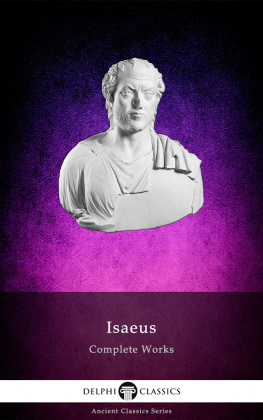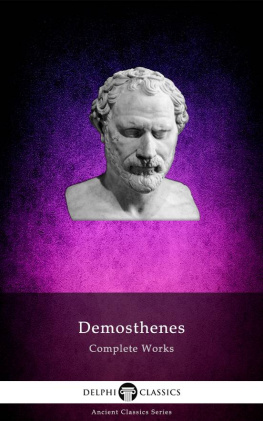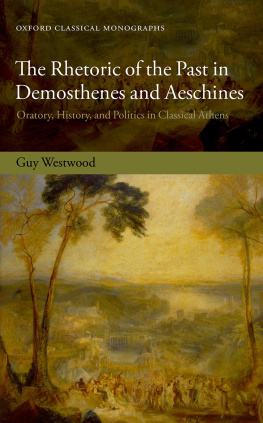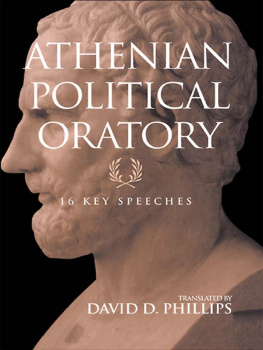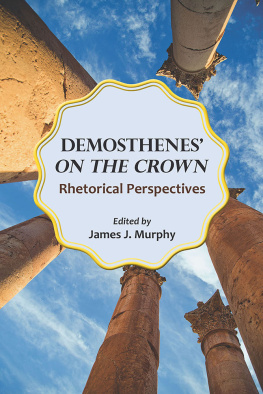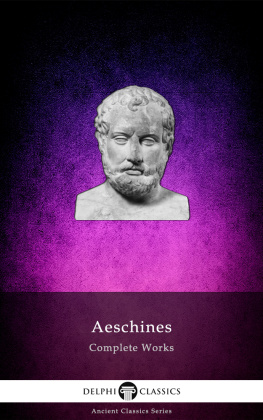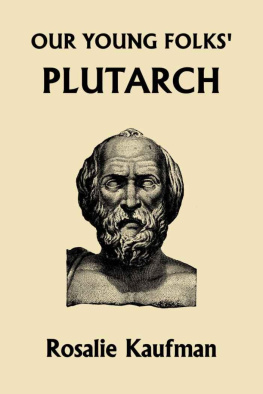A Commentary on Demosthenes Philippic I
AMERICAN PHILOLOGICAL ASSOCIATION
TEXTS AND COMMENTARIES SERIES
Series Editor
Justina Gregory
Sallusts Bellum Catilinae, Second Edition
J. T. Ramsey
A Commentary on Demosthenes Philippic I: With Rhetorical
Analyses of Philippics II and III
Cecil Wooten
A Commentary on Demosthenes Philippic I
With Rhetorical Analyses of Philippics II and III
Cecil Wooten


Oxford University Press, Inc., publishes works that further
Oxford Universitys objective of excellence
in research, scholarship, and education.
Oxford New York
Auckland Cape Town Dar es Salaam Hong Kong Karachi
Kuala Lumpur Madrid Melbourne Mexico City Nairobi
New Delhi Shanghai Taipei Toronto
With offices in
Argentina Austria Brazil Chile Czech Republic France Greece
Guatemala Hungary Italy Japan Poland Portugal Singapore
South Korea Switzerland Thailand Turkey Ukraine Vietnam
Copyright 2008 by the American Philological Association
Published by Oxford University Press, Inc.
198 Madison Avenue, New York, New York 10016
www.oup.com
Oxford is a registered trademark of Oxford University Press
All rights reserved. No part of this publication may be reproduced,
stored in a retrieval system, or transmitted, in any form or by any means,
electronic, mechanical, photocopying, recording, or otherwise,
without the prior permission of Oxford University Press.
Library of Congress Cataloging-in-Publication Data
Wooten, Cecil W., 1945
A commentary on Demosthenes Philippic I:
with rhetorical analyses of Philippics II and III /
Cecil Wooten.
p. cm.
ISBN 9780195333268; 9780195333275 (pbk.)
1. Demosthenes. Philippicae. I. Title.
PA3950.P6.W66 2008
885.01dc22 2007011352
1 3 5 7 9 8 6 4 2
Printed in the United States of America
on acid-free paper
George Alexander Kennedy
magistro atque amico optimo
Preface
The most recent commentary in English on Demosthenes Philippics appeared in 1907; it has been out of print since the 1960s. In part because of the lack of a modern commentary, what are arguably the finest deliberative speeches from antiquity are not often read these days in American colleges and universities. I hope that the present volume will correct that lack and will encourage more study of Demosthenes. The commentary is aimed at advanced undergraduates and first-year graduate students, and it addresses rhetorical and stylistic matters, historical background, and grammatical issues. In the rhetorical analysis I rely primarily on the theories of ancient rhetoricians, especially Hermogenes, who was particularly interested in Demosthenes. I have prepared a commentary for the First Philippic only; for each of the other two speeches I have provided a brief historical introduction, an outline, and an essay emphasizing its differences from Philippic I. I have organized the book in this way because it seemed to me that in some courses only one of the speeches, most likely the first, would be read. If students, having already been introduced to Demosthenic language and rhetorical technique and the historical background, then wanted to read the second and third Philippics, they could, I felt, manage on their own if provided with some general guidance about structure, argument, and style.
I have chosen not to treat Philippic IV. There has always been some controversy about its authenticity, and, in any case, a very thorough commentary appeared in 2002: Istvn Hajdu, Kommentar zur 4. Philippischen Rede des Demosthenes (Berlin).
I would like to thank many friends who have unfailingly given me support, encouragement, and sustenance of various sorts during the last few years as I worked on this project: Francis and Helen Barlow, Niko Endres, Allan Gurganus, Jane Holding, Sharon James, Sara Mack, Harriet Horwitz and Rick Meyer, and Daisy Thorp. I would also like to thank Galen Rowe, now deceased, who read my first analysis of Philippic I, and in particular Bill Race, who encouraged me from beginning to end, meticulously read many versions of the manuscript, and gave me many invaluable suggestions. Everyone should be so lucky to have such a good colleague and friend. Finally, I want to express my gratitude to Victor Bers and Harvey Yunis, who, like the mythical heroes who made two trips to the underworld, read the manuscript not once but twice and gave me many useful suggestions, to the members of the Publications Committee of the American Philological Association, in particular to the chairman of that committee, Justina Gregory, who has been encouraging, helpful, and extremely professional throughout the process of submission, to the staff at Oxford University Press, who have been wonderful to work with, and to Mary Bellino, who did a superb job of copyediting the manuscript. I also want to thank the University Research Council at the University of North Carolina at Chapel Hill for their financial assistance in the publication of this book.
George Kennedy has been kind and generous to me since the beginning of my career almost forty years ago. He has been a good mentor and a good friend, and it is to him that I gratefully dedicate this book.
Contents
Abbreviations and Bibliography
A complete annotated bibliography of work on Demosthenes, arranged topically and by speech, can be found in Donald Jackson and Galen Rowe, Demosthenes 19151965, Lustrum 14 (1969): 7109, and for the period after 1965 in Felipe G. Hernndez Muoz, Demostenes 19651997: Repertorio Bibliogrfico, Tempus 21 (1999): 3771. The line numbers in the analysis refer to the Oxford Classical Text by M. R. Dilts (Oxford, 2002).
Aristides | Aristidis Qui Feruntur Libri Rhetorici II, ed. W. Schmid (Leipzig, 1926). |
Aristotle | Ars Rhetorica. ed. W. D. Ross (Oxford, 1959). All translations from this work come from George Kennedy, Aristotle: On Rhetoric (Oxford, 1991). |
Bers | Victor Bers, Speech in Speech: Studies in Incorporated Oratio Recta in Attic Drama and Oratory (London, 1997). |
Black | E. Black, The Second Persona, Quarterly Journal of Speech 56 (1970): 10919. |
Blass | Friedrich Blass, Die Attische Beredsamkeit, 2nd ed., vol. 3.1 (Leipzig, 1893). |
Borza | Eugene N. Borza, In the Shadow of Olympus: The Emergence of Macedon (Princeton, 1990). |
Carlier | Pierre Carlier, Dmosthne (Paris, 1990). |
Cawkwell | G. L. Cawkwell, Eubulus, Journal of Hellenic Studies 83 (1963): 4767. |
CIA | Corpus Inscriptionum Atticarum (Berlin, 187395) |
[Cicero] | Rhetoric to Herennius. All quotations from this work come from the translation by H. Caplan in the Loeb Classical Library (Cambridge, Mass., 1954). |
Davies | Gilbert A. Davies, ed., Demosthenes: Philippics I, II, and III (Cambridge, 1907). |
Next page

